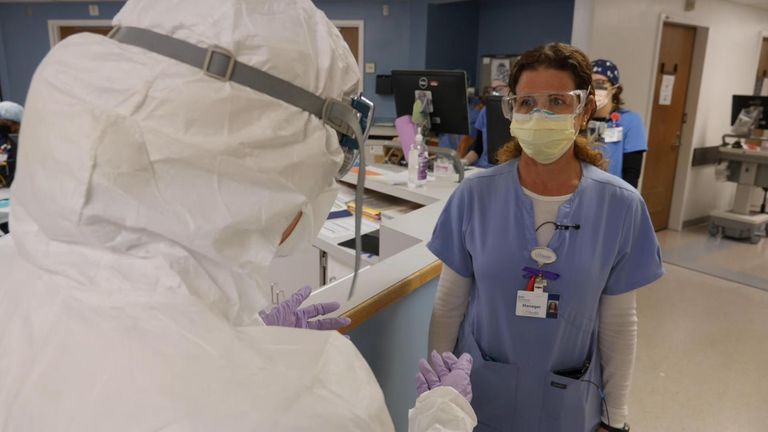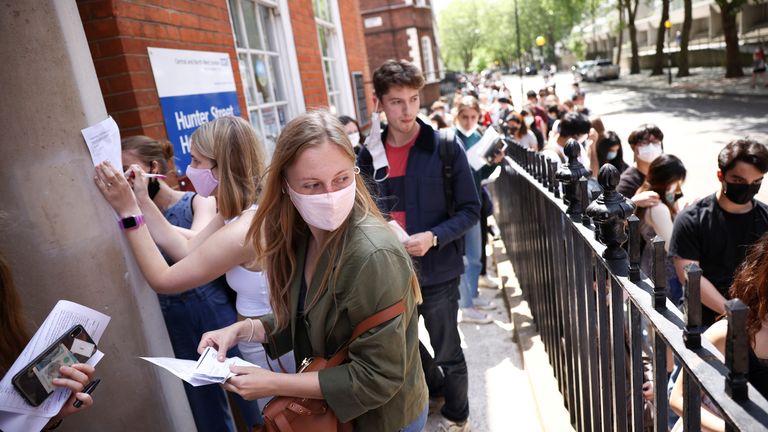COVID-19: Florida sees record number of coronavirus patients in hospital – many of whom are unvaccinated
The nurses in the COVID unit at UF Health hospital in Jacksonville, Florida, cannot believe they are here again, reconfiguring their space like a jigsaw puzzle to find room for yet more patients.
Over the past three weeks, coronavirus cases have risen across a country in the grip of the Delta variant, but the surge is particularly pronounced in areas with the lowest vaccination rates.
Florida accounts for 6% of the US population but 20% of the current coronavirus cases.
Not only are almost 13,000 people in hospital in the state, more than at any other point during the pandemic, they are younger than before too.
But for UF Health COVID unit manager Debi Delepaz it is most upsetting because, in her mind, it is avoidable.
“I did not see this coming at all,” she says. “We got comfortable to the point where we only had a couple of COVID patients, then in the space of two-and-a-half weeks, everything changed.
“Now we are having to put two people in rooms that should be for one, we are back to day one and even worse than that.
“We’re taking care of five or six patients at one time which is not an easy task.
“So to see that people are still in denial and don’t think the vaccine can help or don’t wear the mask because it’s not mandatory, it’s really sad because it feels like it could have been prevented – there is a solution to this.”
Of the 233 patients currently being treated at UF Health for coronavirus, 52 are in intensive care but the starkest figure – the one that makes this wave different – is that more than 95% of those people are unvaccinated.
The picture is similar in other hospitals across Jacksonville, the hardest-hit city in Florida.
If ever proof was needed of the effectiveness of vaccines they are here in human form, stricken in hospital beds, hooked up to machines and struggling to breathe.
Lawrence Johnson, a 67-year-old from Jacksonville, is unvaccinated and has been in the UF Health COVID ward for 22 days.
He was first infected by misinformation about vaccines, then infected by the virus itself.
“Every time you turn around you hear all different stories and stuff about the vaccine,” he says. “And you get scared and confused so I didn’t get vaccinated.
“Now I say it is best to have it and not need it, than to not have it and need it and I am a living witness to that. If I’d had the vaccine I wouldn’t be here.”
Mr Johnson is one of the lucky ones – he is getting better – but a long period of rehabilitation will be required.
Another difference in this wave of the pandemic is the number of children becoming seriously unwell after being infected with coronavirus.
Dr Mobeen Rathorne is a paediatrician at UF Health Jacksonville and says the hospital is treating more children than at any other stage of the pandemic.
“Kids do get sick,” he says. “They do go into the hospital, they do get admitted to the ICU, they do get incubated and sadly they do die. We have had deaths.”
Dr Rathborne says the risk factors associated with children and COVID are similar to adults and those who are overweight or with pre-existing conditions such as diabetes are more likely to be severely affected.
But he is also concerned about the long-lasting damage COVID infection could inflict.
“It is true that children are less likely to die but we don’t know about the long term complications,” he says. “Things like brain fog, breathlessness, muscle aches.
“We see children coming in five or six weeks after getting COVID.
“If I have long COVID I may be affected for the next 10 or 15 years, but for a five-year-old child they could be suffering for the next 80 years.”
Source: Read Full Article








